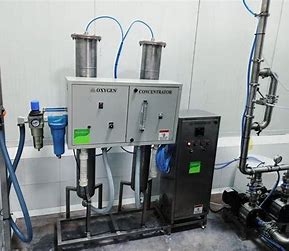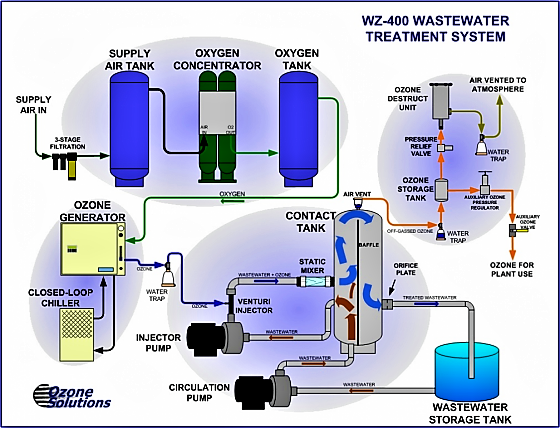
Introduction
In this article, we will explore the relevance and importance of ozone treatment in wastewater management. With the increasing global population and industrial activities, effective wastewater treatment is crucial for maintaining a clean and sustainable environment. Ozone treatment has emerged as a promising method in this field, offering numerous advantages over traditional treatment methods. Let’s delve into the historical background and key concepts of ozone treatment to understand its significance better.
Historical Background
Wastewater treatment has a long history dating back to ancient civilizations. However, it wasn’t until the 19th century that significant advancements were made in this field. The development of sewage systems and the understanding of microbial processes led to the emergence of more efficient treatment methods. In the 20th century, ozone treatment gained attention as a potential solution for wastewater management due to its powerful oxidation and disinfection properties.
Key Concepts and Definitions
Ozone treatment involves the use of ozone, a highly reactive gas composed of three oxygen atoms, to treat wastewater. It plays a crucial role in wastewater management by effectively removing pollutants and improving water quality. The principles behind ozone treatment lie in its strong oxidation and disinfection capabilities. Ozone reacts with various contaminants, breaking them down into harmless byproducts. Terms such as ozonation, oxidation, and disinfection are closely associated with ozone treatment and are vital to understanding its mechanisms.

Main Discussion Points
Effectiveness of ozone treatment in removing pollutants from wastewater
Ozone treatment has proven to be highly effective in removing a wide range of pollutants from wastewater. It can efficiently eliminate organic matter, pharmaceuticals, pesticides, and other contaminants that are not easily removed by conventional treatment methods. Additionally, ozone treatment offers advantages over traditional methods, such as the activated sludge process, by providing superior removal efficiencies and reducing the need for additional treatment steps.
Environmental benefits of ozone treatment in wastewater management
Compared to traditional treatment methods, ozone treatment offers significant environmental benefits. It reduces the usage of chemicals, minimizing the potential adverse effects on ecosystems. Ozone treatment also produces less sludge, thereby reducing the overall waste generated during the process. By improving water quality, ozone treatment contributes to the protection and preservation of aquatic ecosystems.
Energy efficiency and cost-effectiveness of ozone treatment
Ozone treatment has been found to be energy-efficient and cost-effective in wastewater management. Although ozone production requires energy, the overall energy requirements for ozone treatment are comparable to other treatment methods. Additionally, the potential cost savings associated with ozone treatment, such as reduced chemical usage and minimized sludge disposal costs, make it an attractive option for wastewater management systems.

Case Studies or Examples
Several real-world examples highlight the successful implementation of ozone treatment in wastewater management. For instance, the Orange County Water District in California utilizes ozone treatment as the primary step in its advanced water purification process. The result is a reliable and sustainable source of water supply. Other facilities and projects worldwide have also achieved positive results through the implementation of ozone treatment.
Current Trends or Developments
Recent trends and advancements in ozone treatment technology have enhanced its efficacy in wastewater management. Researchers have focused on optimizing ozone dosage and contact time to maximize pollutant removal. Additionally, innovations in ozone generation and delivery systems have improved operational efficiency and reduced maintenance requirements. Continuous research and development in this field promise further advancements in ozone treatment technology.
Challenges or Controversies
While ozone treatment offers numerous benefits, it is not without challenges. One of the primary limitations is the high initial capital investment required for setting up ozone treatment facilities. Additionally, the presence of certain pollutants, such as certain persistent organic pollutants, may require additional treatment steps to achieve complete removal. Controversies surrounding the potential formation of harmful byproducts during ozone treatment also exist, but proper control measures and monitoring can address these concerns.

Future Outlook
The future of ozone treatment in wastewater management looks promising. As technology continues to advance, the effectiveness of ozone treatment is expected to increase further. Emerging technologies, such as ozone-based advanced oxidation processes, hold potential for enhancing pollutant removal. Furthermore, the integration of ozone treatment with other treatment methods and the utilization of renewable energy sources for ozone production may lead to more sustainable wastewater management practices.
Conclusion
Ozone treatment in wastewater management offers a powerful and effective solution for removing pollutants and improving water quality. Its advantages over traditional treatment methods, along with its environmental benefits, energy efficiency, and cost-effectiveness, make it a compelling choice for sustainable wastewater management. With ongoing research and development, the future of ozone treatment holds even greater potential for addressing the challenges of wastewater treatment.




